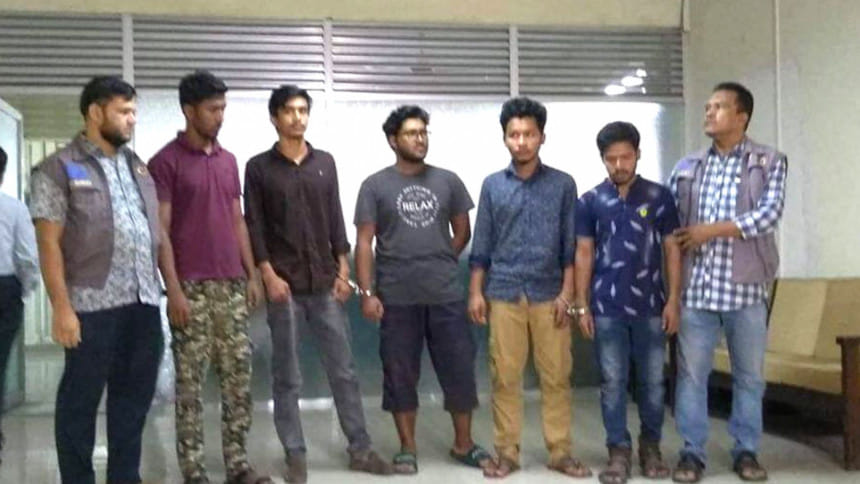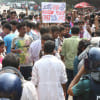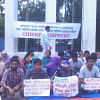First case filed under Digital Security Act

Two days after the president's signing of the Digital Security Bill into a law, the first case under this act was filed against five youths for selling fake MBBS admission test questions on Wednesday.
The five, who are said to have cheated admission seekers by selling fake questions of this year's MBBS admission test, were sued in a case lodged with Paltan Police Station under sections 23, 24 and 26 of the Digital Security Act and Public Examinations (Offences) Act, said Molla Nazrul Islam, special superintendent of Criminal Investigation Department's organised crime unit.
This syndicate used to leak questions of different public universities' entrance exams, said police.
Read more: Rab arrests 5 for 'selling fake question papers'
The five were produced before a Dhaka court with a remand prayer. The court placed each of them on a two-day remand.
In another development, Bangladesh Police has got a fully-fledged specialised unit with jurisdiction to investigate the cases filed under the Digital Security Act and prevent spread of rumours on social media.
In an order, the home ministry's Public Security Division yesterday approved the unit, which is named “Cyber Police Centre”.
FIRST CASE UNDER THE ACT
The CID arrested the five on Wednesday from Jatrabari and Badda areas in the capital with mobiles and laptops. They prepared fake questions of this year's MBBS admission test and circulated those among admission aspirants through messaging apps in exchange for money, Nazrul added.
According to the above sections of the Digital Security Act, the charges brought against them are: digital or electronic fraudulence and identity theft.
At a press briefing at CID headquarters in the capital's Malibagh yesterday, the police official said they used fake Facebook IDs for selling the questions, assuring the admission seekers that the questions would be “100 percent common”. They also took money in advance through mobile transaction.
He added that this year's medical admission test question was not leaked, but the question leak gang made false promises to the admission seekers.
The arrestees are Kawsar Gazi, 19, one of the kingpins of the gang, Sohel Mia, 21, Tarikul Islam Shovon, 19, Rubaiyat Tanvir Adittya, 19, and Masudur Rahman Imon, 19.
Of them, Sohel opened a mobile transaction account using the national identity card of another person, said the police official, adding that the gang had been doing this for a long time.
“The case is under investigation. Hopefully, we will be able to arrest more members of the group,” the CID official added.
CID Sub-inspector Shibbir Ahmed produced the five before a Dhaka court yesterday, seeking a seven-day remand prayer for each. Metropolitan Magistrate Sattyabrata Shikder granted each of them a two-day remand.
The much-debated Digital Security Bill becomes a law after the president signed it on Monday amid widespread criticism that it curbs freedom of speech and expression and media freedom guaranteed by the constitution.
The law was passed in parliament on September 19, keeping a harsh provision which allows police officials to search or arrest anyone without any warrant.
On several occasions, the Sampadak Parishad (Editors' Council) and media practitioners expressed serious concern over sections 8, 21, 25, 28, 29, 31, 32, and 43 of the act, saying the provisions restrict free-thinking, freedom of speech and freedom of expression. But the law was enacted keeping the provisions intact.
'CYBER POLICE CENTRE'
The specialised unit of CID, “Cyber Police Centre”, will have 342 posts and it will function under the organisational structure of the CID, according to the home ministry's order.
Headed by a deputy inspector general, the specialised unit will have two additional deputy inspector generals, three superintendents of police, six additional SPs, 18 assistant SPs, 45 inspectors, 140 sub-inspectors, 30 assistant sub-inspectors, 75 constables and 22 other support staffers.
CID officer Nazrul told The Daily Star yesterday that they were hopeful of providing special support to prevent rumours and social media crimes as the unit would enhance their capacity.
Sources said the new unit would start using special social media monitoring tools for watching the digital arena when it would have full manpower. They would use the open source intelligence software to check database and information of different social media sites.
Currently, the Dhaka Metropolitan Police has only a 70-member cyber security division dedicated to cyber cases. The detective branch of DMP also investigates cyber-related incidents but on a small scale.
Besides, Police Headquarters has formed a cyber crime “coordination cell”, and the cell has already started their activities from the first week of September to prevent spread of rumours and fake news during the upcoming national election, according to officials.
Around 100 police teams across the country are giving their updates to the cell, and these teams will also check activities of social media platforms during the national election, they added.

 For all latest news, follow The Daily Star's Google News channel.
For all latest news, follow The Daily Star's Google News channel. 








Comments